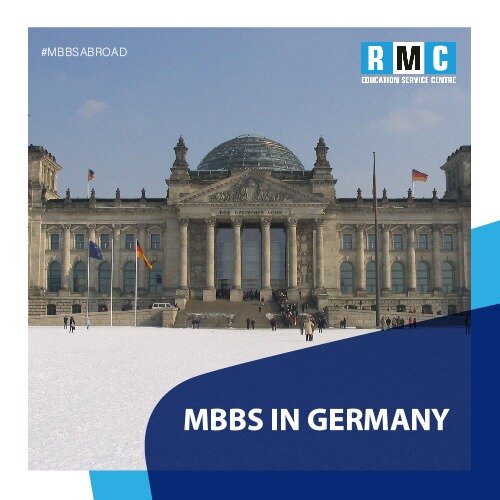 MBBS in Germany
MBBS in Germany
(Full Detail about MBBS in Germany)
Germany is a popular choice for those wishing to pursue an MBBS, which is the German equivalent of an M.D., because of its excellent educational system, affordable or free tuition, and emphasis on hands-on learning and research.(MBBS Scholarships in Germany).
Overview
| Basic Eligibility | 10+2 (PCB) with 60% |
| Last Date to Apply | 15 January 2025 for Upcoming Summer Semester 15 July for Upcoming Winter Semester |
| NEET Exam | Compulsory |
| IELTS | Required |
| TOEFL | Required |
| MBBS Course Duration (In years) | 5+1 (1 year of Internship) |
| Cost of Living in Germany | INR 72,610 per month |
| Minimum Course Fee | INR 5 lakhs per year |
| Maximum Course Fee | INR 11 lakhs per year |
| Medium of Education | German & English |
| Recognition of Universities | MCI & WHO accredited |
Program Structure for MBBS
The average length of a medical program in Germany is six years and three months. Pre-clinical studies (basic sciences), clinical studies (practical training), and the “Praktisches Jahr,” the last year of practical training, are all included.
Curriculum: There are three phases to the program:
Vorklinik Pre-Clinical Phase: The first two years are devoted to the study of theory in areas such as anatomy, physiology, and biochemistry.
Clinical Phase (Klinik): Over the following three years, there will be further hands-on training and clinical experience, including hospital internships. (MBBS Scholarships in Germany)
The last year is devoted to practical clinical training in several medical specialties, including internal medicine, surgery, and a selected elective. This is known as the “Praktisches Jahr.”

Requirements in Language
Proficiency in German: Since the majority of medical programs in Germany are taught in German,
Admission Conditions
Abitur or Equivalent: International students must possess a certification that is equivalent to the Abitur, whereas German students require the Abitur, or German high school diploma.
Entrance Exams: If an international student’s high school diploma does not entirely align with the German Abitur, some universities may need them to take an entrance exam, also known as the Feststellungsprüfung.
Preliminary Course (Studienkolleg): In order to fill in any gaps in their academic background, students may occasionally need to attend a Studienkolleg preparation course.
Top Medical Universities
Germany is the home of numerous highly regarded medical schools, such as
- Heidelberg University
- Munich’s Ludwig Maximilian University (LMU Munich)
- Berlin’s Universitätsmedizin Charité
- Munich Technical University (TUM)
- Freiburg University
- Frankfurt’s Goethe University
Cost of Tuition
(fee of MBBS in Germany)
Both local and foreign students attending public universities in Germany are typically not required to pay tuition for undergraduate degrees, which includes medicine. Nonetheless, a small administrative charge of between €150 and €300 could be assessed each
Living Expenses: Accommodation, food, health insurance, and transportation are all things that students need to budget for. Depending on the city, the average cost of living ranges from €850 to €1,200 a month.
Financial Assistance and Scholarships
There are scholarships available to aid with living expenses even if tuition is usually free. International students can apply for scholarships from organizations such as the German Academic Exchange Service (DAAD). Furthermore, financial help is offered by certain colleges and private groups according to need or merit.
Practical Experience and Clinical Training
Superior Instruction: Germany is renowned for having well-equipped hospitals and an outstanding healthcare system. Clinical rotations and internships are essential components of the curriculum that provide medical students with a wealth of real-world experience.
Research Opportunities: Students can participate in state-of-the-art research programs in Germany, which provides substantial support for medical research.
Read Also:
Post-Graduation Pathways
(Application process of MBBS in Germany)
Graduates who have completed the medical program are eligible to apply for medical licenses (Approbation) provided they pass the state examination (Ärztliche Prüfung). They can now practice medicine in Germany as a result.
Residency & Specialization: Graduates can enroll in a residency program, which usually lasts five to six years, to choose to specialize in a certain field. Because this instruction is compensated, graduates can make money while honing their skills.
Working in Germany: Germany is a desirable destination for foreign graduates who want to stay and work there because of the high demand for doctors, especially in rural areas.
 Recognition Abroad
Recognition Abroad
Global recognition and great regard are accorded to German medical degrees. If you intend to practice medicine abroad after graduation, you might have to meet extra requirements, like passing the national licensure examination.
Difficulties Faced by Foreign Students
MBBS Scholarships in germany
Language Barrier: For non-German speakers, the language barrier poses a serious problem because the majority of programs are in German.
Competitive Admission: International applicants, in particular, face intense competition for admission to German medical schools. Excellent academic standing and fluency in German are prerequisites. (MBBS Scholarships in germany)
Read Also:
- Goethe University Best Scholarships in Germany 2024
- List of best Scholarships in Germany for international Students
- Best PhD Scholarships in Max Planck Research School
Remember the different deadlines for Summer and Winter!
(How can apply in Germany for MBBS)
-
Two Semesters
Structure of an academic year in Germany.
-
Winter Semester
October – March
Application deadline: July 15th -
Summer Semester
April-September
Application deadline: January 15thYou’ll need: your passport, biometric photo, certificate of enrollment, proof of: finances, health insurance, and residence; plus the visa application filled out (MBBS Scholarships in germany)

